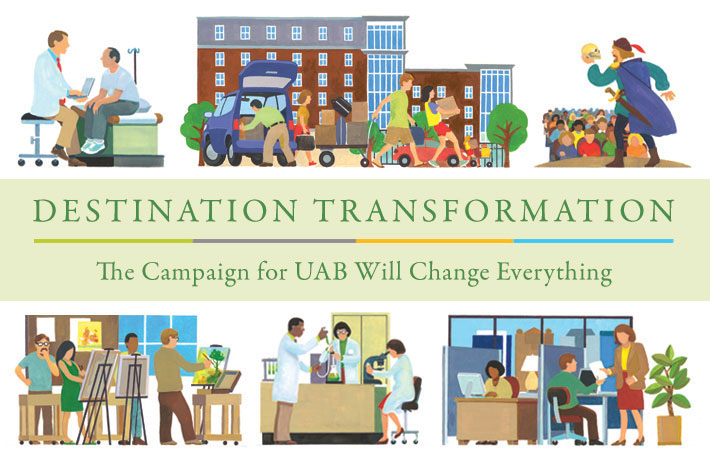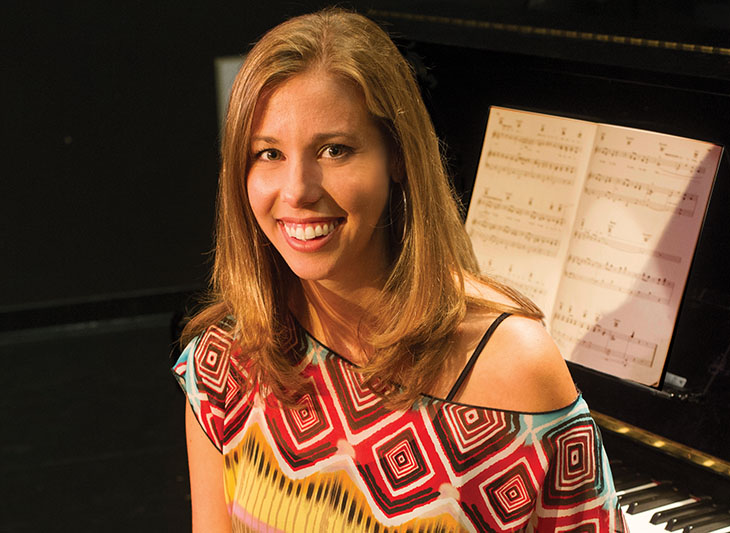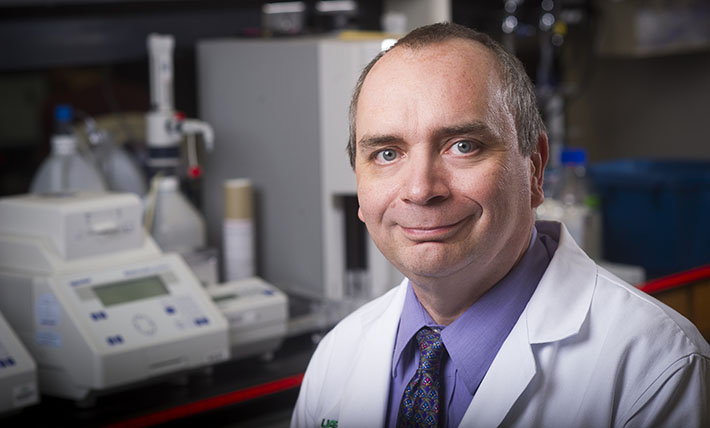UAB Magazine Online Features
Destination Transformation

By Matt Windsor • Illustrations by Ernie Eldredge
In June 2012, five years after she was diagnosed with pancreatic cancer at the UAB Comprehensive Cancer Center, Lessley Hynson threw a party. The guest list included doctors, nurses, CT scan technicians—“anybody who had anything to do with my care,” says Hynson. She had beat heavy odds to make it so far; only 5 percent of patients with pancreatic cancer reach the five-year milestone.
“I’m aware of how few people survive, and it still surprises me all the time that I made it,” says Hynson, who credits UAB surgeon Martin Heslin, M.D.— and an experimental vaccine treatment she received at the Cancer Center— for her success. “I’m very blessed.” Hynson is already planning her 10-year bash, but she is also gearing up for an even bigger party “when the cancer cure is here.”
Hynson is doing all she can to hasten that day. “UAB has given me life,” she says. “The least I can do is give as much of my life and abilities back as I can.” In the past five years, she has helped raise around $150,000 for UAB pancreatic cancer research through the Robert E. Reed Gastrointestinal Oncology Research Foundation. “My goal is to raise enough money to fund one researcher every year,” Hynson says. She has had the chance to meet many scientists working at the Cancer Center, and their dedication “is overwhelming,” she says. “They are committed to finding a cure for cancer, and I think it is going to happen at UAB.”
Show Time

Show Time
A New Lead for Musical Theatre at UAB
By Rosalind FournierValerie Accetta, M.F.A., assistant professor in the Department of Theatre and the head of UAB’s new bachelor of fine arts degree program in musical theatre, has plenty of impressive roles under her belt, from playing romantic lead Margy Frake in the first national tour of Rodgers and Hammerstein’s State Fair to singing baroque opera in Greece. Making it on Broadway, or any other venue, requires more than hitting the high notes, Accetta explains.
UAB Magazine: What’s the secret to success in musical theatre?
Accetta: Obviously you should be talented in a lot of different areas; you should be able to sing and dance and act. But I also want my students to understand the importance of being business savvy, to know which connections you need to make and then to build those relationships. That is almost more important than having talent. When you’re first starting out, your agent’s not going to call you every day with an audition. You’re going to have to go to open calls and wait outside at 6:00 in the morning if you’re going to make it happen.
Brain Bodyguard

Brain Bodyguard
David Geldmacher Makes Moves Against Alzheimer's
By Robin Sutton Anders and Eleanor Spicer RiceAlzheimer’s disease affects millions of Americans and is the nation’s sixth leading cause of death. Alzheimer’s is marked by the accelerating death of brain cells, which means early detection is critical, says David Geldmacher, M.D., director of the UAB Division of Memory Disorders and Behavioral Neurology and Charles and Patsy Collat Professor of Neurology. Geldmacher, an expert on Alzheimer’s diagnosis and management, shares his latest research and reveals some common myths about the disease.
Thinking Globally, Acting Locally

Students practice collaborative community outreach in Birmingham in preparation for solving the world's problems.
By Rosalind FournierKathryn Van Marter-Sanders is preparing for a career in the Peace Corps with a master’s degree from the UAB School of Public Health. But before she travels abroad, the second-year student has already tackled real community health problems in Birmingham as part of the UAB Interprofessional Global Health Service Learning (IGHSL) program.
The program, which launched in spring 2013, begins with classroom instruction in health disparities, global health, project planning, and interdisciplinary teamwork. Then students join together in small groups to implement these lessons in a real-life project with a community partner. Van Marter-Sanders chose the homeless-advocacy group One Roof for her project, working with UAB undergraduate students Stephen Voss, William Carter, and Agam Dhawan to design a vulnerability index for homeless individuals in Birmingham. Vulnerability indexes are used in other communities to identify those who face the highest health risks and should be prioritized for spots in available housing.
Van Marter-Sanders says she learned first and foremost that no one area of expertise can solve a problem on its own. “There are so many factors involved,” she explains. “Whether it’s fighting homelessness, disease, or other issues related to public wellness, if I were just to look at it from the perspective of my background in public health, I would be missing so many other factors that are just as important.”
